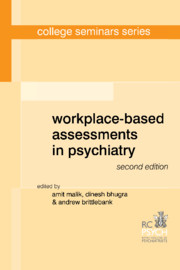Book contents
- Frontmatter
- Contents
- List of tables, boxes and figures
- List of contributors
- Preface
- 1 Introduction: changes in training
- 2 Workplace-based assessment methods: literature overview
- 3 Case-based discussion
- 4 The mini-Assessed Clinical Encounter (mini-ACE)
- 5 The Assessment of Clinical Expertise (ACE)
- 6 Multi-source feedback
- 7 Direct Observation of Non-Clinical Skills: a new tool to assess higher psychiatric trainees
- 8 Workplace-based assessments in psychotherapy
- 9 Educational supervisor's report
- 10 Portfolios
- 11 Annual Review of Competence Progression (ARCP)
- 12 Examinations in the era of competency training
- 13 Piloting workplace-based assessments in psychiatry
- 14 Developing and delivering an online assessment system: Assessments Online
- 15 A trainee perspective of workplace-based assessments
- 16 Conclusions
- Appendix 1 Assessment forms
- Appendix 2 Guide for ARCP panels in core psychiatry training
- Appendix 3 The MRCPsych examination
- Index
1 - Introduction: changes in training
Published online by Cambridge University Press: 01 January 2018
- Frontmatter
- Contents
- List of tables, boxes and figures
- List of contributors
- Preface
- 1 Introduction: changes in training
- 2 Workplace-based assessment methods: literature overview
- 3 Case-based discussion
- 4 The mini-Assessed Clinical Encounter (mini-ACE)
- 5 The Assessment of Clinical Expertise (ACE)
- 6 Multi-source feedback
- 7 Direct Observation of Non-Clinical Skills: a new tool to assess higher psychiatric trainees
- 8 Workplace-based assessments in psychotherapy
- 9 Educational supervisor's report
- 10 Portfolios
- 11 Annual Review of Competence Progression (ARCP)
- 12 Examinations in the era of competency training
- 13 Piloting workplace-based assessments in psychiatry
- 14 Developing and delivering an online assessment system: Assessments Online
- 15 A trainee perspective of workplace-based assessments
- 16 Conclusions
- Appendix 1 Assessment forms
- Appendix 2 Guide for ARCP panels in core psychiatry training
- Appendix 3 The MRCPsych examination
- Index
Summary
This chapter outlines the developments in postgraduate medical education in the UK that will influence psychiatric training for many years to come. It especially focuses on the role of the Postgraduate Medical Education and Training Board (PMETB), before its merger with the General Medical Council (GMC), and its development of principles for assessments in postgraduate training. There is a brief description of the Royal College of Psychiatrists’ (‘the College's’) activities for the assessment of future trainees in the context of wider changes in postgraduate training in the UK. The challenges of the assessment of clinical competence and clinical performance are considered. Some of the basic concepts of competency- and performance-based assessments are outlined. Workplace-based assessments (WPBAs), tools for which are discussed in subsequent chapters, are placed in the context of familiar assessments and examinations of clinical competence and performance, including the traditional long case and Objective Structured Clinical Examinations (OSCEs). The concept of a programme of assessments is introduced, and there is mention of how these separate assessments may fit together for both formative and summative purposes. There is a section with some basic pointers that trainees and trainers must consider when undertaking WPBAs. Finally, there is a brief section on supervisor reports, which always have been, and will continue to be, indispensable in the assessment of trainee performance; these are discussed in greater detail in Chapter 9.
Changes to training
Since the introduction of the PMETB and Modernising Medical Careers (MMC) in the early 2000s, many developments have influenced the structure of and principles underpinning postgraduate medical training in the UK.
Context
The Postgraduate Medical Education and Training Board was set up as an independent regulator for postgraduate medical training and came live in 2005. It established principles for curricula and assessment systems to guide postgraduate medical training in the UK. The Royal College of Psychiatrists’ curricula were underpinned by these principles, thus making the system more workplace- and competency-based. Following the Tooke report (Independent Inquiry into MMC, 2008), PMETB merged with the GMC in April 2010.
- Type
- Chapter
- Information
- Workplace-Based Assessments in Psychiatry , pp. 1 - 13Publisher: Royal College of PsychiatristsPrint publication year: 2011



